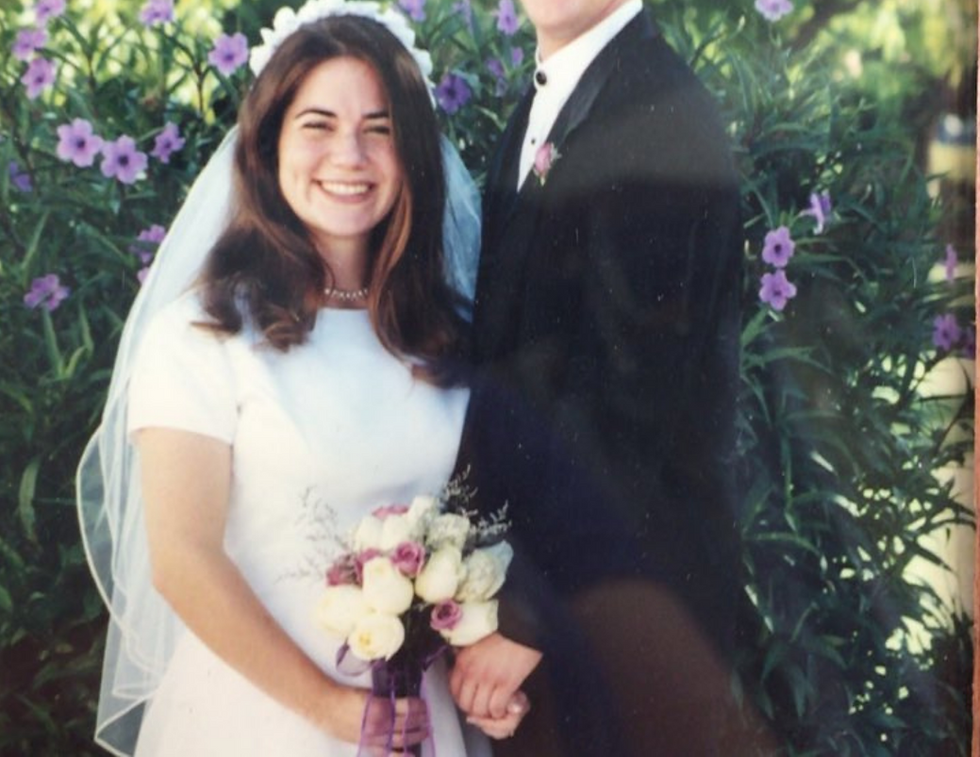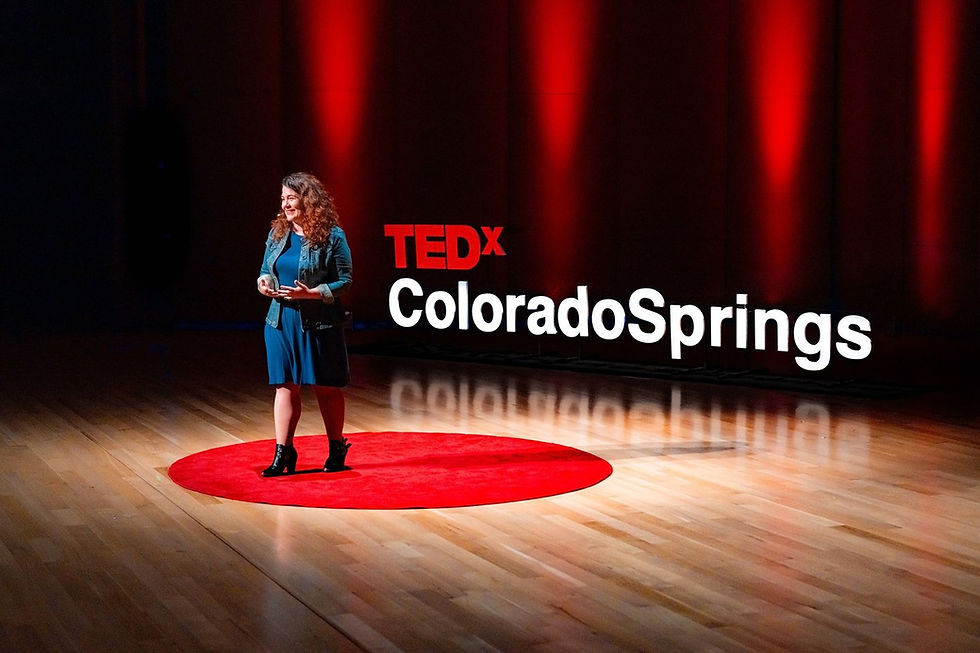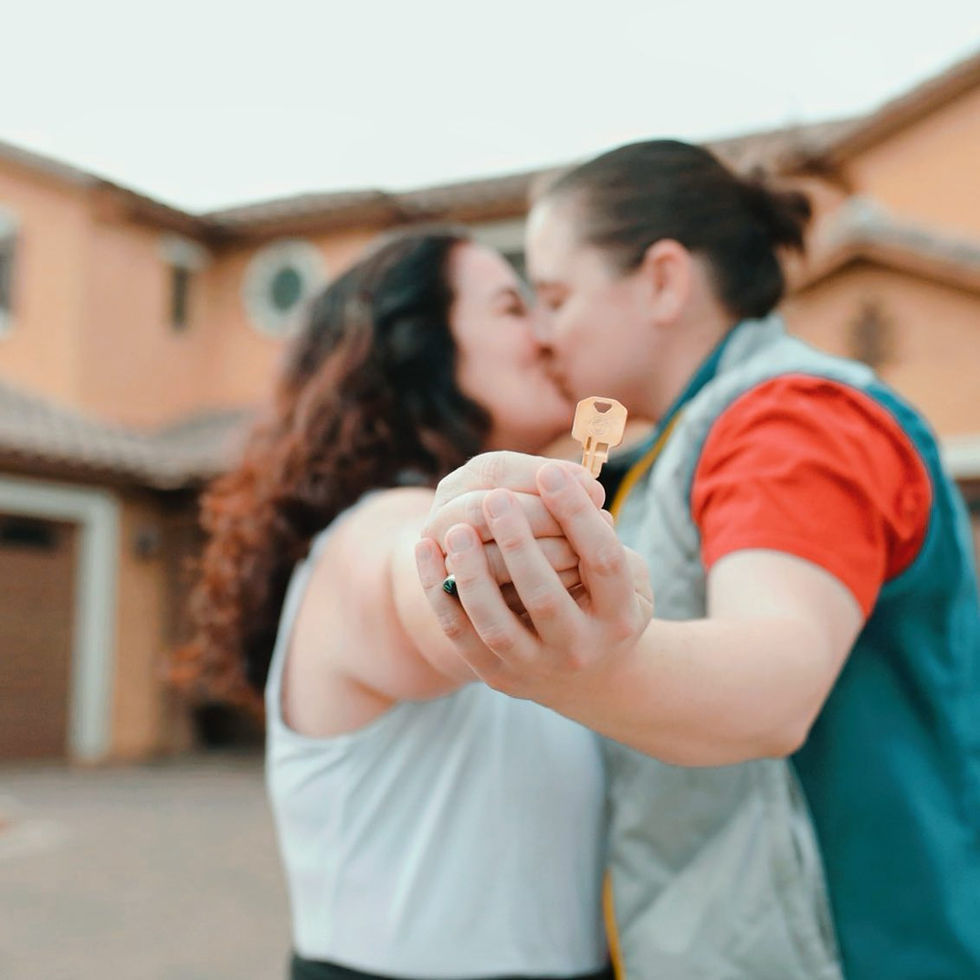Elena Joy Thurston: Mormon mom of four undergoes conversion therapy before coming out, whole
- Marie G-G
- Feb 22, 2021
- 11 min read
Updated: Feb 23, 2021

As a podcaster for justice, I stand with my sisters from the Women of Color Podcasters Community. We are podcasters united to condemn the tragic murders of George Floyd and Breonna Taylor and many others at the hands of police. This is a continuation of the systemic racism pervasive in our country since its inception and we are committed to standing against racism in all its forms.
Trigger warning: This podcast episode contains some mature content.
This week I’m launching my “Healing Herself” series, as I share stories from four women who have survived body issues, sexual assault, shame, and trauma. Each of them has healed herself. Elena Joy Thurston was a Mormon mom of four before waking up to the fact she was gay, Madeleine Black survived gang rape as a teen in the UK, Leah Carey tried to be a “good girl” for decades before waking up sexually in her early 40s, and Stefanie Bonastia struggled with anorexia and bulimia before finding her way back to a healthy body image.
Elena Joy Thurston is an inspirational LGBTQ speaker, trainer, and founder of the nonprofit Pride and Joy Foundation, which is dedicated to reducing the rate of suicide and homelessness in the LGBTQ community. A Mormon mom of four who lost her marriage, her church, and her community when she came out as a lesbian, Elena’s viral TEDx talk on surviving conversion therapy has been viewed 40,000+ times and landed her media and speaking opportunities with ABC, CBS, FOX, Boston’s First Event, Seacoast Wellness Series, and THRIVE.

Elena was born to parents who came from strong Episcopal and Catholic backgrounds in New England. Their families did not get along, so they decided to move west with Elena’s older brother and sister, ending up in Arizona. Elena came along when her older sister was nine years old. When she was eight, her parents gave up on trying to make their chaotic marriage work.
“By the time I was 16 I was feeling the effects of a chaotic family life of parents who could not figure out how to get along and who could not figure out how to be stable adults. I was searching for a lot of answers, trying to figure out where my community is. And how am I going to raise a functional family if I don't even know what a functional family looks like?”
When her friend introduced her to a church that had all the answers to those questions, she jumped at the chance to be in a place that taught her how to have a functional family, how to be a mom and wife, and how to be a woman. She felt like she finally belonged somewhere.
She got baptized in the Latter Day Saints Church at age 16 and married at 20. At 23 she started having babies, and by the time she was 33 she had four kids.

“I find it really interesting to look back on that whole origin story and to realize that here are my parents who moved across the country to get away from religious drama and 16 years later their daughter dives into the baptismal font.”

Her dad thought it was a phase, but he also said, “We didn't see anything wrong with it. We didn't know you were going to do it for 20 years.”
I told Elena about one of my other podcast guests, writer Julie Lythcott-Haims, who also got baptized as a Mormon in her teens. She too found community in the church, although her biracial parents were not thrilled with the news. We spoke about the family focus and community building in the church.
“They do the heteronormative white family very well.”
I asked Elena what else drew her to the church, and she said she has realized that she loves to see herself progress. The Mormon religion is highly focused on helping its members progress and becoming better people.
“That really jived with me. That got me on a core level, that I could have a checklist of things I could do, and when that checklist is completed, that was proof that I was worthy of God."
Elena moved to Utah soon after marriage so her husband could attend Brigham Young University.

“Anyone who's Mormon will tell you there is Mormon...and then there's Utah Mormon...and then there is BYU, Utah Mormon. I was in a totally different culture and immersed deeply into this concept of women. Their job is to have babies and to be nurturers, and to be the soft side of humanity. And men are men, and their job is to be strong and to provide and defend.”
Immersed in those values, she decided she needed to have a baby. That was not as easy as she thought it would be, as babies were popping out regularly in the married student housing where they resided. It took her a few years to conceive, during which time she questioned her value and worth.
“I finally did get pregnant and had my baby and I started that path of converting my children to the gospel. That was a pivotal part of being a good Mormon mom…if your children didn't believe the way they needed to believe, it was your fault you didn't teach them.”

Elena describes her ex-husband as an incredibly hard worker and very smart. But his successful career meant he was working 60 to 80 hours a week while Elena was essentially a single mom. She hardly saw her husband. Her peers were in similar positions: they were all stay-at-home moms with very young children, bored and exhausted.
“That is right for some women...and it's beautiful and fulfilling for them. And I just wasn't in that place. That's a really hard thing for a lot of Mormon women. Because man, we love our kids. But we're told the best way to love our kids is to devote ourselves to only that, which eats away at you and your soul becomes less and less and less, and then you have nothing more to give.”
When her youngest went off to kindergarten, she had six hours to think for herself every single day. She realized how unhappy she was, but she was ashamed that she wasn’t happy.
“I was disgusted with myself, so I just put a blanket over that shame in my head and refused to acknowledge it and instead I distracted myself with a lot of different things, but mostly with a lot of working out…I was doing all of it so that I could feel the shame and the sadness of being discontent and unsatisfied with my life, when I felt like I had no right to be, and so that kind of started this path of trying to find happiness.”
She sought out hobbies, but even they didn’t fill up enough time to get rid of the chatter in her head…until she found fly fishing, which was incredibly healing for her.

“You're standing in the middle of a river and you have to be so present and so embodied because your reflexes have to be so fast…you don't have the time or bandwidth to think, ‘Did I read my scriptures this morning? Did I say my prayers this morning?’ You just have to be there…I realized I felt safe to be in my body. I was safe to be present…it helped me to find some solace within my own body instead of constantly trying to improve my body or fix my body or ignore something in my body."
That safety she finally felt in her body opened her up to happiness and love. And a friendship blossomed into love and happiness, with another woman.
She realized why she didn’t like her life. She was trying to convince herself for 17 years that she was in love with a man, but she now realized she didn’t want to share a bed with him.
She still had to deal with the huge shame she felt about being attracted to a woman, so for three weeks she went behind her husband’s back. She was falling completely in love while also feeling like a total wreck. Because she is a bad liar, her husband figured out something was off.
“It wasn't even an option for me to leave him. Neither one of us even considered that. It was just that I had sinned. I had been disrespectful and disloyal, and now I needed to repent.”
The next day she spoke to her bishop (lay leader in the Mormon church) and asked to start the “repentance process.” This involved this electrical engineer by day asking her all sorts of intimate and invasive questions so he could determine if she needed to go to a disciplinary hearing or if she should be excommunicated.
Six weeks later, she thought she was doing really well, but she couldn’t stop thinking about her new love. A friend suggested she make an appointment with a therapist who would help her become straight again and fix her life.
Enter conversion therapy, which often consists of camps where young people are forced to watch homoerotic images and drink a charcoal liquid that makes them vomit. The other option is talk therapy, which has the same suicide rate as the other types of conversion therapy.
Elena’s therapist told her that if she was attracted to another woman, something had happened to her when she was a kid to cause this attraction. He aimed to find out what happened and help her deal with it.
“God wouldn't make me this way. It's not my fault that I'm attracted to women. It is some horrible situation that happened to me as a kid.”
For the first few months Elena got some benefit from the four-days-a-week, two-hour sessions, because she was able to heal from her chaotic family memories. But the $270/day bills began to add up and it didn’t seem like she was “getting better.”

At one point she considered suicide, like so many other Mormon teens and adults who have undergone conversion therapy.
“I wasn't making any progress. I must be too broken. I must be past the point of being able to be fixed. God must not want me to be fixed, otherwise God would fix me, right? I must be so unworthy of God's love that I am not able to retrieve it and so why am I still here?”
One day Elena shared with her therapist that she was gang raped at the age of 15. She’d never told her parents or her husband. Her therapist was “overjoyed,” believing that was the key to her attraction to women. He had her tell the story with all the details six times in that two-hour period, guiding her to end the story in a different way each time.
Then. The Brett Kavanaugh hearings happened, which was a deeply traumatic period for each woman who has experienced sexual assault or harassment.

“I'm getting chills just thinking about what that week was like for literally every woman. To have to hear her own trauma be put on display in front of all of those men and then to be mocked and ridiculed was just horrific. I honestly feel like our entire generation of women is going to need to heal from that experience.”
As she was reading the news and hearing even her own sons say words like “we can’t actually believe her,” she began seeing headlines saying that 3/4 of American women have been assaulted at some time in their life. She read about Harvey Weinstein, Bill Cosby, and many other famous men who had attacked women. And women began coming out of the woodwork, finally sharing long-buried stories.
And she had an epiphany.
“So here I am, watching all of these statistics come out and all of these prominent women come out and I finally put the dots together. If 75% of American women have been assaulted at some time in their life, 75% of American women are not gay. It was like lightning struck my head and I finally opened my eyes and realized I have been deceived so badly.”
After she woke up, Elena moved out and began pursuing divorce. When she heard her ex-husband was going to out her to her kids, she knew she had to tell her story first. The two younger girls made it easy, but it was harder to tell her older boys. She was the one who had taught them that homosexuality was a sin and if they masturbated, they would become gay. But her sons were not surprised when she came out. They are still navigating the situation, but they love their mom.
One of the biggest losses for Elena was her community and all of her friends, some of whom she’d known for 10 to 20 years.
“Some of them really tried, but I continued to figure out where my own boundaries are…I had to say to them, ‘do you think I'm a sinner? Because I realized I can't be a true authentic friend to someone who thinks I'm a sinner.’ And the only response that they could come up with collectively was: ‘we’re all sinners.’ I was the one who had to say 'I can't be real and authentic with you, the way I have been for the last 15 years, if you view me as a sinner.'”

Now, three years later, Elena is at a great place in her life, in love and founder of the Pride and Joy Foundation, which serves the LBGTQIA community. She’s learning lesbian lingo and feeling, for the first time, that she belongs.
“I realized very quickly early on that the more I could expose my kids to other queer families, the more they felt normal…as we know, that's like a defining factor of childhood. It's normal to feel like you belong, and so the more families they met that either had LGBTQ children or LGBTQ parents, our family functioned better.”
She created the nonprofit to provide a connection point for other families that need that same thing. She’s been able to provide training in companies to teach people the concept of valuing versus tolerating and how that plays out in the workplace.
Still, she’s navigating how to be a mom who’s completely changed from how her children knew her before.

Recently Elena has been inspired by Arlan Hamilton’s book It's About Damn Time: How to Turn Being Underestimated into Your Greatest Advantage. She likes to follow writers who are inspiring her to think in different ways.
As an ex-Mormon, she’s had to navigate buying regular underwear, trying to drink coffee and wine, and learning a new language like “catalyst.”
We spoke about my interview with nonbinary trans activist Harris Eddie Hill, and Elena’s foundation has planned a fireside chat with Harris on Sunday, February 28. I highly recommend this event! You can find out more information on the Pride and Joy Foundation website or register here.

I asked Elena what she would tell her 21-year-old self:
“Everyone deserves mind-blowing, incredible sex.”

She continues to be inspired by the people she’s meeting, including an Orthodox Jewish woman who realized her sexuality a little later in life and whose own child recently came out to her. Elena spoke about the deep ambivalence associated with this kind of coming out.
“Your first reaction is to think, ‘aren't you overjoyed that you were able to set a good example living true to yourself?’ But internalized homophobia is a real thing, and when your kid comes out to you and you feel this mix of like did I do this to you, is this my fault? It takes a lot of intentionality to overcome that, and I've watched her overcome that in these last few weeks.”
Elena is still not a coffee or wine fan, but three years after leaving her Mormon life and community, she is healing herself one day at a time.
Next week’s “Healing Herself” guest is Madeleine Black, my second guest from the UK, who survived a gang rape at the tender age of 13. She also has a viral TED talk; has her own podcast, Unbroken; and has written a book about the experience.
The Finding Fertile Ground podcast is brought to you by Fertile Ground Communications. If you enjoyed this podcast, please give us a rating and subscribe to hear our next episode.
Contact us if you can use some help with your writing, editing, communications, or marketing. With 30 years of experience in the environmental consulting industry, I am passionate about sustainability and corporate citizenship, equity & inclusion, businesses that use their power for good, and doing everything I can to create a kinder, more sustainable, and just world. We help organizations and people discover what makes them special and help them share that with the world.
Fertile Ground Communications LLC is a certified women-owned business enterprise, disadvantaged business enterprise, and emerging small business.




Comments